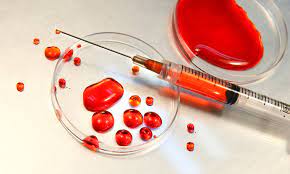
The Sunday News

Bruce Ndlovu, Sunday Life Reporter
*GOGO MaMoyo was shocked when, as she tidied up her grandsons’ bedroom, she came across a small sachet which contained what looked like tomato sauce.
MaMoyo was disturbed not only by the colour of the liquid in the sachet but the smell that it produced.
A pungent odour, like rotting blood, had invaded her grandsons’ room, giving off a sickening odour, leading her to rush for the nearest window.
She was at a loss for words.
Knowing the mischief that young people get up to, she sent a picture of her foul smelling discovery to Mupatirapamwe, an organisation that deals with substance abuse in under-privileged communities around the country.
For members of this organisation, who have come face-to-face with the ravaging effects of drug abuse and the lengths that people will go to get their next high, the sachet and its revolting contents confirmed their worst fears.
A method of drug taking that is perhaps the most daring and dangerous had finally found its way to the streets of Zimbabwe.
It had taken a while but it had finally arrived. In 2018, it was reported that in South Africa, addicts of nyaope, a cocktail of heroin, antiretroviral drugs and even crushed glass as well as rat poison, were not only taking this hazardous concoction but were also withdrawing blood from their veins and then injecting it to others.
The bizarre method of drug taking is now starting to become a serious threat in Zimbabwe, where it is jeopardising both the fight against drug abuse and HIV and Aids.
According to Tendai Daka of Mupatirapamwe, an organisation which has been receiving desperate SOS messages from parents around the country, this method of drug administration started among commercial sex workers in Epworth, before spreading to townships around the country.
“We have an emerging dynamic of substance and drug administration using a method known as bluetoothing, hot-spotting or flush-blooding as it is commonly known in other countries. In Zimbabwe, it kicked off in the streets of Epworth, mostly through the commercial sex workers. There was a drug that came from our neighbouring countries called nyaope. This drug is basically a mixture of heroine, rat poison, cannabis as well as ARVs. The marijuana produces a hallucinogenic effect while ARV produce the same effect as drugs like LCD. So people started taking nyaope but the greatest challenge was that people could not afford it which also applied to crystal meth,” he said.
Daka said this method of drug use was popular among low income earning users, who were looking for a cheap high.
In South Africa, reports said the high from this method of drug administration did not usually last long, with users forced to search for their next fix within a couple of hours.
“So, people started using bluetoothing which is the administration of a drug whereby one injects themselves with a particular substance and then because others do not have money to get high, they hotspot or bluetooth from the one that is already high. By bluetoothing, we mean that people take a needle, whether it is a clean needle or has been shared, withdraw their blood and then inject into another person,” Daka said.
With most drug users having little to no care on the safety of needles they used for this process, Daka said bluetoothing was now a serious threat to the country’s so far successful fight against HIV and Aids.
While a total of 1,3 million people are living with HIV in Zimbabwe, it was revealed that the country is recording a decline in the prevalence and incidence owing to several interventions.
“When it comes to a person from who the blood is withdrawn from, in most cases they don’t know the HIV status of that person. Research shows that when it comes to using drugs, people don’t care about taking any precautions. Their number one priority is getting high so in most cases, they do not take into consideration whether they are using a clean needle or they are injecting the blood of someone who’s HIV-positive into their bodies. They just don’t care about that kind of thing and that is the problem we are facing,” he said.
Daka said even more worryingly was that the blood of drug users was now being packaged into sachets for sale on the streets.
He said they were not yet aware how this blood was preserved. This latest fad, he said, was now complicating the country’s fight against drug abuse. The Government last year declared the drug and substance abuse menace a “state of disaster” lamenting its baleful impacts, especially among the youths, prompting the adoption of swift mitigation measures including establishing reaction teams from national to village level.
“It is not only nyaope users that are doing this. It applies to any other form of blood because anyone can hotspot any drug to any different person and that person gets high. We are now getting reports of people withdrawing it from a lot of people, repackaging it into small plastic sachets and then selling it within the streets to attract other low income earning drug users. So this is currently the challenge that we are facing and it is serious because this way of drug administration is dangerous in more ways than one.”
*Not her real name



